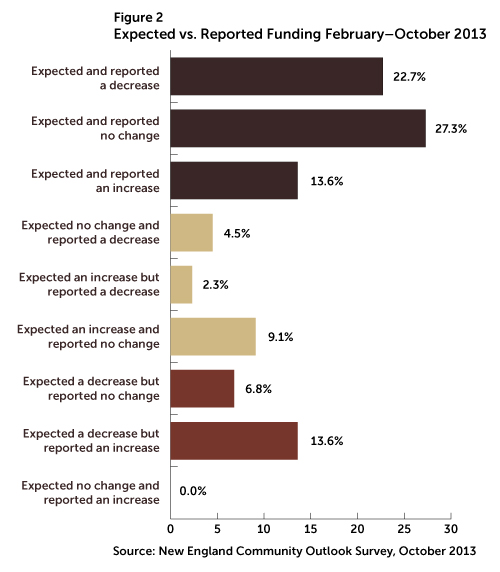January 2014: The Impact of Fiscal Uncertainty 
“Sequestration and the budget battle resulting in the partial shut-down of the Federal Government has made lives difficult for many who depend on the services funded by the government.”
—New England Community Outlook Survey respondent from New Hampshire
From October 1 to October 16, the federal government partially shut down due to a budget impasse in the U.S. Congress. Over the same time period, the Federal Reserve Bank of Boston launched the New England Community Outlook Survey. Predictably, many of the respondents to the survey chose to focus on the shutdown when asked about specific policy challenges preventing them from fulfilling their missions. Forty-six percent of respondents faced policy challenges, and of those respondents, 22% specifically mention the government shutdown as a barrier. According to the Bureau of Labor Statistics (BLS) in regard to the establishment survey1: “There were no discernible impacts of the partial federal government shutdown on the estimates of employment, hours, and earnings. …” 2,3, But the impact of the shutdown goes beyond national-level job numbers. The Special Supplemental Nutrition Program for Women, Infants, and Children (WIC) immediately saw its funding fall to zero. Suddenly, the program had to figure out how it was going to provide nutritional benefits to almost 9 million women, children, and infants who depended on the program.4 By working with state agencies and some creative financing decisions, the United States Department of Agriculture (USDA) indicated that they would be able to continue to make payments through late October. However, after that, “federal WIC funding may not be sufficient to cover benefits.” 5
"Strengthening families and individuals in this community requires the ability to provide services comprehensively and in a customized manner. The current funding climate with respect to sequestration and now Government shutdown makes this increasingly difficult to do. Positive economic outcomes are possible, but only with the right tools and resources."
—New England Community Outlook respondent from Rhode Island
However, to many survey respondents, the government shutdown represented more than just a temporary suspension of funding; it was a symptom of a much deeper issue and a source of future problems from ongoing uncertainty. As one respondent summarized, organizations face significant policy headwinds from “…uncertainties caused by Congressional dysfunction related to sequestration, budget and debt ceiling shut down.” The uncertainty is reflected in the survey responses regarding reported and future funding expectations. Using a panel of 48 respondents from both the New England Community Outlook Survey in February as well as the one in October, only 58% were able to accurately predict the survey-reported direction of their funding over the next six months. Only a single organization (2%) expected an increase in funding but experienced a decrease. Conversely, six respondents (14%) expecting a decrease in funding experienced an increase instead. (Figure 2) Uncertainty surrounding funding prevents organizations from planning for the future or expanding their capacity to serve. When asked, 76% of survey respondents expected their capacity to serve to either decrease or remain the same over the next six months. (Figure 3)
2 images


 About the Authors
About the Authors
Kaili Mauricio
Anthony S Poore

 Endnotes
Endnotes
- The BLS employment survey uses two different surveys in order to estimate unemployment: an establishment survey of business establishments and a household survey.
- U.S. Bureau of Labor Statistics, “Frequently asked questions: The impact of the partial federal government shutdown on the Employment Situation for October 2013,” November 8, 2013, p. 2 (located at: http://www.bls.gov/bls/shutdown_2013_empsit_qa.pdf).
- The BLS does note that the household survey of employment did display some effect of the shutdown due to furloughed federal government workers. Since the shutdown was expected to be temporary, the long-term employment effects would be negligible.
- U.S. Department of Agriculture, “Nutrition Program Facts,” December, 2012, p. 1 (located at: http://www.fns.usda.gov/sites/default/files/WIC-Fact-Sheet.pdf).
- U.S. Department of Agriculture, “Food, Nutrition and Consumer Service (FNCS) Contingency and Reconstitution Plan,” October 1, 2013, p. 2 (locate at: http://www.usda.gov/documents/usda-fns-shutdown-plan.pdf).






